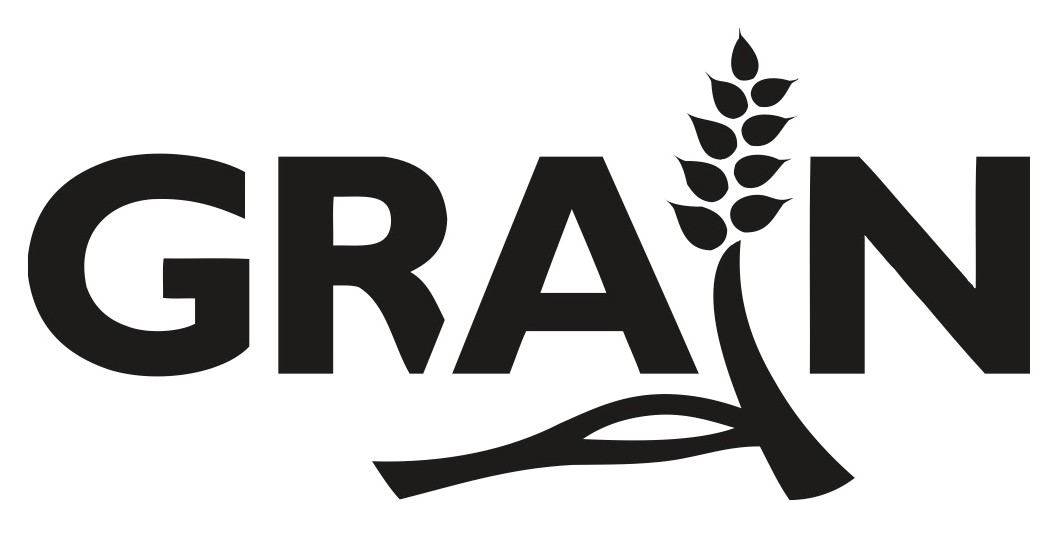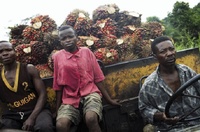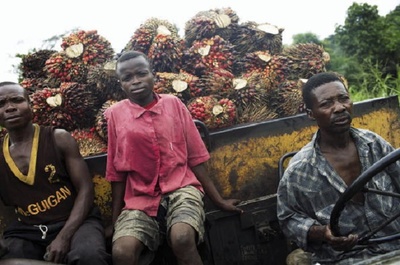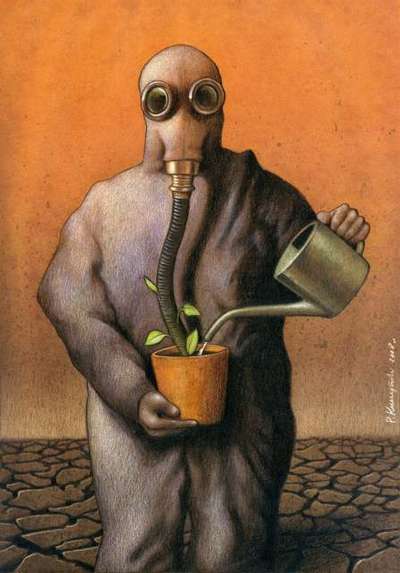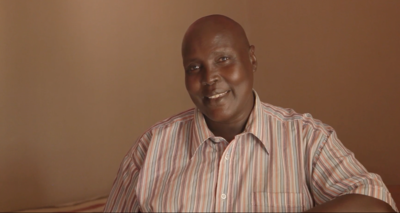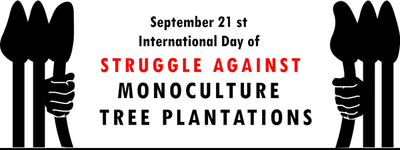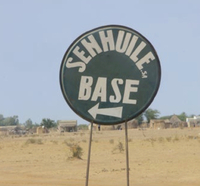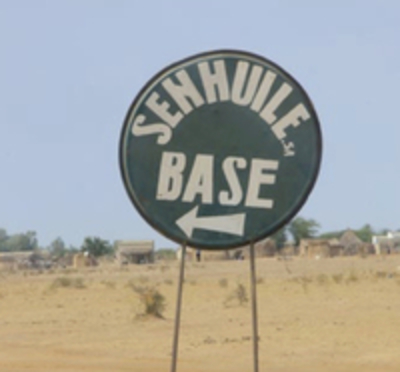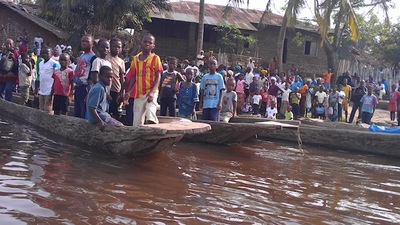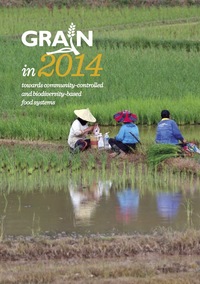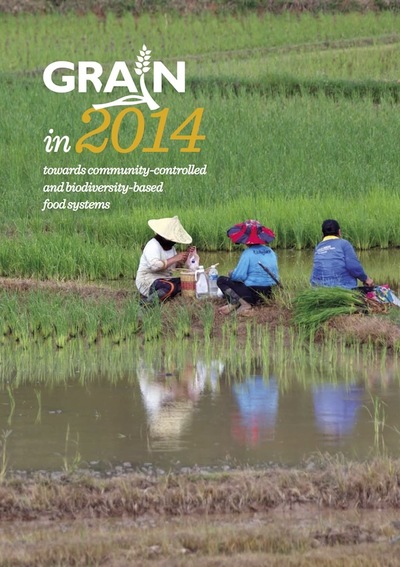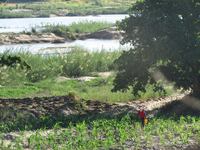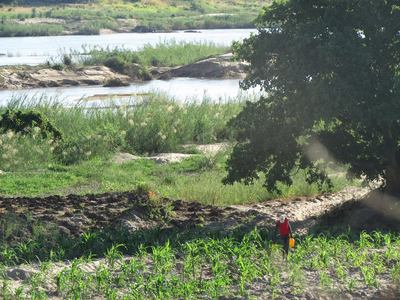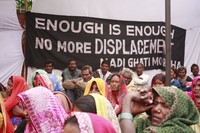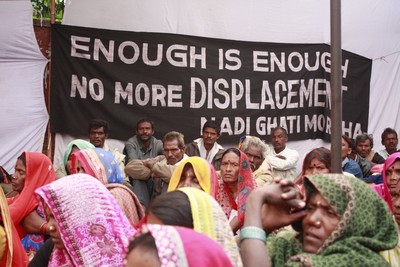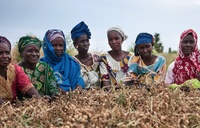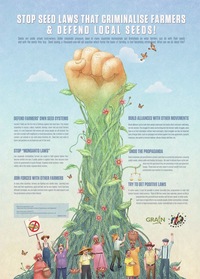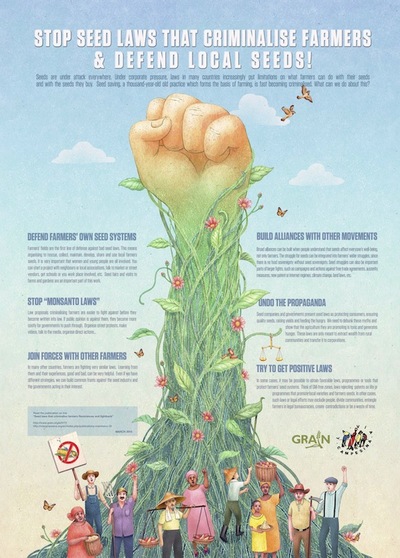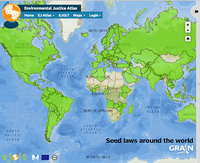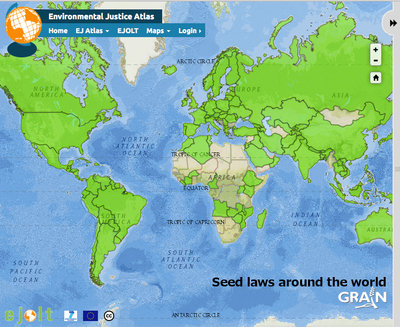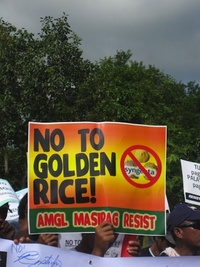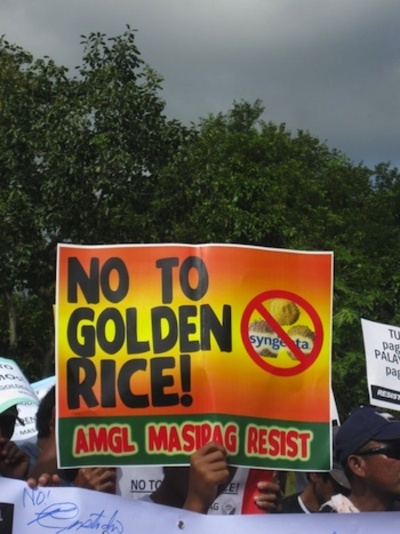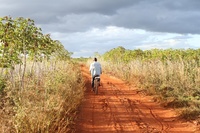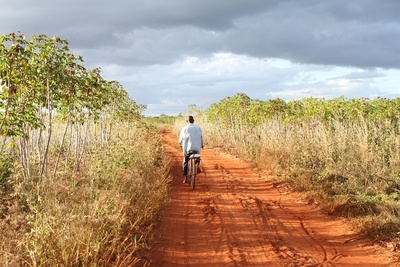by GRAIN | 14 Oct 2015 Land | Corporations
Rules on how to “responsibly” invest in farmland are popping up all over the place, from corporate boardrooms to UN meeting halls. But do they really help communities whose lands are being targeted or do they just help investors and the governments that are complicit with them? Where should we—as social movements trying to support communities—focus our efforts? Does it make sense to fight land grabbing by adopting rules on how to do it more responsibly? In this discussion paper, GRAIN aims to stimulate reflection and discussion on these important questions.
Rules on how to “responsibly” invest in farmland are popping up all over the place, from corporate boardrooms to UN meeting halls. But do they really help communities whose lands are being targeted or do they just help investors and the governments that are complicit with them? Where should we—as social movements trying to support communities—focus our efforts? Does it make sense to fight land grabbing by adopting rules on how to do it more responsibly? In this discussion paper, GRAIN aims to stimulate reflection and discussion on these important questions.
by GRAIN | 30 Sep 2015 Climate
World leaders are about to converge for the 21st Conference of the Parties (COP21) in Paris in December, but there is only one major intergovernmental initiative that has emerged to deal with climate change and agriculture – and it is controlled by the world's largest fertiliser companies.
World leaders are about to converge for the 21st Conference of the Parties (COP21) in Paris in December, but there is only one major intergovernmental initiative that has emerged to deal with climate change and agriculture – and it is controlled by the world's largest fertiliser companies.
by Human Rights Watch, Bread for All, GRAIN, Anywaa Survival Organisation, Oakland Institute and Inclusive Development International | 22 Sep 2015
Ethiopian authorities should immediately drop all charges and release a former World Bank translator and two other local activists charged under Ethiopia’s repressive anti-terrorism law after trying to attend a workshop on food security in Nairobi, six international development and human rights groups said today.
Ethiopian authorities should immediately drop all charges and release a former World Bank translator and two other local activists charged under Ethiopia’s repressive anti-terrorism law after trying to attend a workshop on food security in Nairobi, six international development and human rights groups said today.
by Social organisations from Latin America, Africa and Asia | 21 Sep 2015
Declaration by social organisations from several countries in Latin America, Africa and Asia on 21 September 2015 – International Day of Struggle against Tree Monocultures
Declaration by social organisations from several countries in Latin America, Africa and Asia on 21 September 2015 – International Day of Struggle against Tree Monocultures
by Le Collectif pour la Défense du Ndiaël and Re:Common | 24 Jul 2015 Media releases
A new report by Italian researchers shows that the controversial Senhuile project in Senegal is on the verge of collapse. The project, initiated by Italian and Senegalese investors four years ago to produce biofuels, has provoked fierce resistance from affected communities in which six people have died.
A new report by Italian researchers shows that the controversial Senhuile project in Senegal is on the verge of collapse. The project, initiated by Italian and Senegalese investors four years ago to produce biofuels, has provoked fierce resistance from affected communities in which six people have died.
by RIAO-RDC & GRAIN | 2 Jun 2015 Land | Corporations
How did several of the world's most prominent DFIs come to own Feronia Inc., a Canadian agribusiness company that people in the DRC say is illegally occupying their land, subjecting them to horrific work in plantations and leaving their communities destitute?
How did several of the world's most prominent DFIs come to own Feronia Inc., a Canadian agribusiness company that people in the DRC say is illegally occupying their land, subjecting them to horrific work in plantations and leaving their communities destitute?
by GRAIN | 18 May 2015 Activity reports
Corporations; people's control over seeds; land grabbing; and agriculture and the climate crisis – these are the interconnected themes of GRAIN's work. In partnership with allies across the world, we document the ways in which the industrial food system damages lives, livelihoods and ecologies, and support the fight for alternatives.
Corporations; people's control over seeds; land grabbing; and agriculture and the climate crisis – these are the interconnected themes of GRAIN's work. In partnership with allies across the world, we document the ways in which the industrial food system damages lives, livelihoods and ecologies, and support the fight for alternatives.
by ADECRU | GRAIN | 11 May 2015 Land
More than half a million people living in communities along the banks of the Lúrio River in northern Mozambique will be severely affected if the country's Council of Ministers approves the Lúrio River Valley Development Project (DVRL) in the controversial Nacala Corridor.
More than half a million people living in communities along the banks of the Lúrio River in northern Mozambique will be severely affected if the country's Council of Ministers approves the Lúrio River Valley Development Project (DVRL) in the controversial Nacala Corridor.
by GRAIN | 30 Apr 2015 Land
Asia is a land of small farmers. But across the continent, governments are introducing changes to land laws that threaten to displace millions of peasants and undermine local food systems. The region is witnessing an agrarian reform in reverse.
Asia is a land of small farmers. But across the continent, governments are introducing changes to land laws that threaten to displace millions of peasants and undermine local food systems. The region is witnessing an agrarian reform in reverse.
by La Via Campesina | GRAIN | 8 Apr 2015 Seeds
Seeds are under attack everywhere. Under corporate pressure, laws in many countries increasingly put limitations on what farmers can do with their seeds and with the seeds they buy. Seed saving, a thousand-year-old practice which forms the basis of farming, is fast becoming criminalised.
What can we do about this?
Seeds are under attack everywhere. Under corporate pressure, laws in many countries increasingly put limitations on what farmers can do with their seeds and with the seeds they buy. Seed saving, a thousand-year-old practice which forms the basis of farming, is fast becoming criminalised.
What can we do about this?
by La Via Campesina & GRAIN | 7 Apr 2015 Seeds
Seeds are under attack everywhere. Under corporate pressure, laws in many countries increasingly put limitations on what farmers can do with their seeds and with the seeds they buy. Seed saving, a thousand-year-old practice which forms the basis of farming, is fast becoming criminalised. What can we do about this?
Seeds are under attack everywhere. Under corporate pressure, laws in many countries increasingly put limitations on what farmers can do with their seeds and with the seeds they buy. Seed saving, a thousand-year-old practice which forms the basis of farming, is fast becoming criminalised. What can we do about this?
by La Via Campesina | GRAIN | 7 Apr 2015 Seeds
Seeds are the basis of productive, social and cultural processes that give rural people the ability to maintain a degree of autonomy and to refuse to be completely controlled by big business and big money. For the corporate interests that are striving to take control of land, farming, food and the huge market that these represent, this independence is an obstacle.
Seeds are the basis of productive, social and cultural processes that give rural people the ability to maintain a degree of autonomy and to refuse to be completely controlled by big business and big money. For the corporate interests that are striving to take control of land, farming, food and the huge market that these represent, this independence is an obstacle.
by STOP Golden Rice Alliance | 10 Mar 2015 Seeds
With inexpensive Vitamin A abundantly available from various natural sources, it is a mistake to turn blindly to Golden Rice, a crop that the International Rice Research Institute itself admits it has not yet determined can actually improve vitamin A intake. Farmers and civil society organisations strongly denounce the Golden Rice Campaign Tour planned for the Philippines, Bangladesh, and India from 4-20 March 2015 and continue to call for the defence of traditional and farmer-bred crop varieties and the prohibition of the commercialisation of Golden Rice.
With inexpensive Vitamin A abundantly available from various natural sources, it is a mistake to turn blindly to Golden Rice, a crop that the International Rice Research Institute itself admits it has not yet determined can actually improve vitamin A intake. Farmers and civil society organisations strongly denounce the Golden Rice Campaign Tour planned for the Philippines, Bangladesh, and India from 4-20 March 2015 and continue to call for the defence of traditional and farmer-bred crop varieties and the prohibition of the commercialisation of Golden Rice.
by GRAIN | 2 Mar 2015 Corporations
Transnational food companies are taking over traditional distribution channels in the South and replacing local foods with cheap, processed junk food, often with the direct support of governments. Free trade and investment agreements have been critical to their success. The case of Mexico provides a stark picture of the consequences for the world's poorest people.
Transnational food companies are taking over traditional distribution channels in the South and replacing local foods with cheap, processed junk food, often with the direct support of governments. Free trade and investment agreements have been critical to their success. The case of Mexico provides a stark picture of the consequences for the world's poorest people.
by UNAC | GRAIN | 19 Feb 2015 Land
A new report by Mozambique's National Farmers' Union (UNAC) and GRAIN shows there is a colonial-style scramble for Africa's farm lands under way. Politically-connected companies based in offshore tax havens have grabbed hundreds of thousands of hectares of farmland from peasants in Mozambique.
A new report by Mozambique's National Farmers' Union (UNAC) and GRAIN shows there is a colonial-style scramble for Africa's farm lands under way. Politically-connected companies based in offshore tax havens have grabbed hundreds of thousands of hectares of farmland from peasants in Mozambique.
